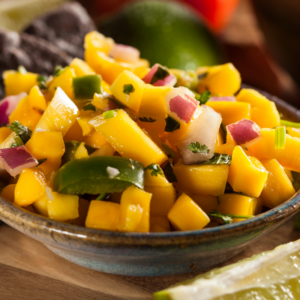Mango trees have a very long life, did you know that they can produce mangos for up to 400 years! And it’s a good thing because the fruit can take up to 7 months to become ripe.
Sweet and savory, these popular fruits are great in salads, as salsas, or just on their own. You can pick them up year round at the grocery store in the produce section or look for pickled mangos in the ethnic food aisle.
Here’s Today’s TRICK:
The easiest way to cut a mango is to cut around the seed and remove a large piece of flesh. Take a knife and cut the flesh into cubes, but leaving the flesh still attached to the mango skin. Once the flesh is cut into cubes turn the skin outwards, this will resemble a hedgehog. Now it’s easy to just bite off the skin or cut off for cooking.
Here’s a TIP:
A mushy mango is too ripe. Look for mangos that are firm and fragrant.
And your RECIPE:

Mango Salsa
Ingredients
- 3 ripe mangos pitted and cubed
- 1 tablespoon red onion minced
- 1/4 cup fresh cilantro chopped
- Optional: 1/2 jalapeno pepper seeded and minced
Instructions
- In a salad bowl combine mangos, red onion, cilantro, and jalapeno pepper (if desired).
- Let stand for ten minutes.
0 Responses
Just an FYI for folks with severe allergies to poison ivy – you might be allergic to mango, too. They’re in the same plant family, Anacardiaceae, and as a result, share some chemical similarities. The oils that cause the reactions in poison ivy are present in a similar form in the skin of the mango fruit. Generally, only those very allergic to poison ivy will react and will have an itchy rash around the mouth where the peel has come in contact with the skin. Eating the fruit generally isn’t a problem though – this is a contact dermatitis issue not a food allergy! As a result, if you peel the fruit before eating it instead of biting it off of the peel, the incidence of reaction is greatly diminished.
I lived in the Carribean for a couple of years and ate mangos ALL of the time – with nary a bad reaction. Only upon returning to the US and gaining significant reactions to poison ivy has eating mango become an issue. It is a sensitivity issue – the more times you are exposed the greater the subsequent reaction will be. The oils in mango seem to be less reactionary, so repeated exposures to it will likely not cause significant issues in all but the most sensitive, or those of us who have already suffered through many bouts of poison ivy.